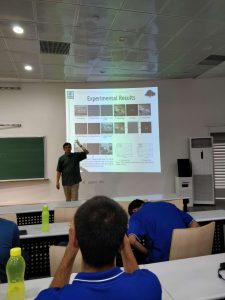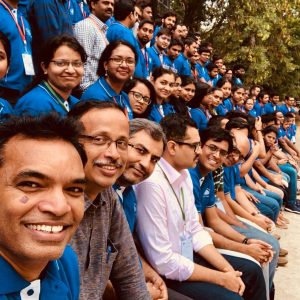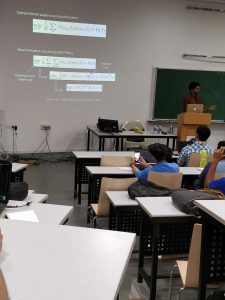IIIT-H presents an opportunity for those interested in diving into Computer Vision and Machine Learning with its summer schools. Sign up to learn more and to interact with leading experts in these fields.
Summers are typically meant for breaks or slowing down. But then again for driven folks, it’s perfect for accelerating their education or careers. Unlike the ubiquitous summer camps that dot the landscape catering to young ones, academic institutions for higher education conduct specialized programmes or activities as an independent course of study for professional or personal purposes. Known as ‘summer schools’, these formal lessons or lectures held during summer breaks comprise a part of education. In the West, there has long been a tradition of high-achieving college students attending summer schools to get additional credits compressing their college education to graduate earlier, to apply elsewhere or to beef up their current resume. Such a trend is catching on here too.
Enabling Research
IIIT-H has been conducting summer schools in specialized topics such as Computer Vision, Machine Learning, Natural Language Processing and Social Computing for the last couple of years. In its 4th edition this year, the summer schools on Computer Vision and Machine Learning are set to be conducted between 1-6 July and 8-13 July respectively. The Centre for Visual Information Technology (CVIT) at IIIT-H ranks as one of the leading research groups in computer vision in India. According to Dr. Anoop Namboodiri, Associate Professor at CVIT, one of the key reasons for initiating these summer schools was to enable students from other universities and institutes to get access and exposure to such high-quality resources. “The areas of machine learning and computer vision are changing rapidly. To do cutting-edge research in these fields, you need to have a solid understanding of the fundamentals as well as how the latest research is being built on top of it. If you have an overall understanding of it, you can afford to do research beyond that. Usually in most of the universities where they teach computer vision and image processing, they’re teaching history. Textbooks are outdated, old material is taught. If you look at the current research papers, there’s no way one can jump to that level from what is being currently taught. Thanks to this gap, the quality of research coming out of Indian institutes in general is below par,” explains Prof. Namboodiri. Speaking of how unique the summer schools are, Prof. Namboodiri says that the model followed here is very different from the executive education sort of programmes. “It has deliberately been kept low-cost, just enough to cover the expenses. Money charged here is more to confirm seriousness of the participants rather than anything else,” he says.

Where You Are And What You Want To Do
The original intended audience for the summer schools was ‘currently enrolled Masters or PhD students’ across universities in India. While the expectation is that such students are doing research in the field and want to know more, the programme is also open to undergrads who are very enthusiastic about the field and want to learn something or get into research. It is also open to industry participation for anyone inclined towards research. “We assume that you want to do research, we assume that you are interested in the area, and that you know the basics of it,” says Prof. Namboodiri. Though the programmes are formally christened as Summer School of Computer Vision and Machine Learning respectively, essentially the former deals with the basics of machine learning or application of classic machine learning in areas such as computer vision, image processing, biometrics and so on. The latter is more theoretical and deals with the latest advancements in the area of machine learning.

Learn From The Best
Why attend a class when we live in a virtual world? While one can argue in favour of online courses to get an edge or keep abreast with advancements in the desired fields, there’s no denying the impact of personal interactions. Especially when they come from world-class contributors to the field. Besides lectures from in-house faculty of CVIT, the summer schools are addressed by other eminent national and international speakers who not only talk about research in general but also speak about their specific line of work. The line-up of speakers is impressive and talks are interesting enough to warrant an interest even among IIIT-H students. Owing to the limited duration of the study in such camps, professors and speakers usually set very precise study goals. Such a concentrated ‘camp’ allows one to immerse completely and gain more knowledge. Prof. Namboodiri speaks of two kinds of inputs that students would typically receive here: “We introduce some of the latest topics, of course we connect to the basics and then try to show them how specific research problems are imagined from what is known and what is not known. The second is a hands-on feel to the kind of tools that people are using right now”, he says.

What You Also Get
Besides the unique opportunity to listen and learn from the very best, there are other perks too. Based on their performance at the schools, top 20 participants get awarded a cash prize of Rs 5000 and receive a certificate of performance. In addition to these awardees, two participants having a full, regular paper will be awarded a non-transferable travel grant upto Rs 1 lakh to attend CVPR 2020, an annual premier conference on computer vision and pattern recognition as well as ICCV 2020, the annual international conference on computer vision.
Speaking From Experience
Last year, 22-year-old Krisha Mehta from Dwarkadas J. Sanghvi College of Engineering, Mumbai attended the summer schools on computer vision and machine learning at IIIT-H. She was so blown away by the experience that she blogged about it on Code Like A Girl, an online space “that celebrates redefining society’s perceptions of women in technology”. As an undergraduate attending the summer schools, Krisha says that she was clueless about so many things. “Now I know why conferences are so important in the research world. I know why reading papers, good papers from good conferences, is important. I now understand why it is necessary to be updated with the day-to-day developments of your field. I also learned why implementing a paper is one of the best ways to understand it,” she wrote. When contacted over email and asked what she thought stood out among everything else at the summer schools, Krisha remarked, “It was the opportunity to interact directly with the speakers as well as my fellow attendees. Of course, I learned a lot by attending the lectures. But I learned all the more when I spoke to the speakers personally who were kind enough to answer my questions and help solve my doubts.”
Resources
While there are no prerequisites for attending the program, the organizers do think that a basic understanding of Computer Vision and Machine Learning is necessary. A mathematical background comes in handy too.For those interested in getting a feel of what they’re going to experience, the Resources section on the Summer School page is a good place to start with. It has links to various tutorials and courses, talks by eminent researchers in the field, as well as a ready reckoner to selected papers classified easy-to-comprehend groups such as Fundamentals, Convolutional Neural Networks, Image Classification, Optimization, Reinforcement Learning and so on.
Taking the initiative to go the extra mile always pays, especially when one’s goal is to learn. “The summer schools definitely gave me an edge in my education. I got selected for Deep Learning Indaba, another summer school. My final year project aimed at solving a computer vision problem that I learned about during the summer school. It really provided me with a strong foundation in computer vision and machine learning,” says Krisha.
Catalyzing Research
With the end-goal being to catalyze high-quality research not just among the top research groups of the country but also among the second and third tier institutes, the programme seems to be on the right track. “Earlier, based on textbook knowledge, minor incremental changes is what students would attempt (For example, if I tweak this, what will happen?). Now they need to imagine something that is completely different. We’ve been seeing good work coming out of some of these attendees. The level of thought process changes after attending the summer schools,” affirms Prof. Namboodiri.
More information on the summer schools at:
computer vision – http://cvit.iiit.ac.in/cvsummerschool2019/
machine learning – http://cvit.iiit.ac.in/mlsummerschool2019/


